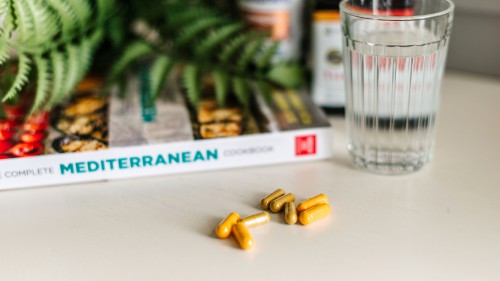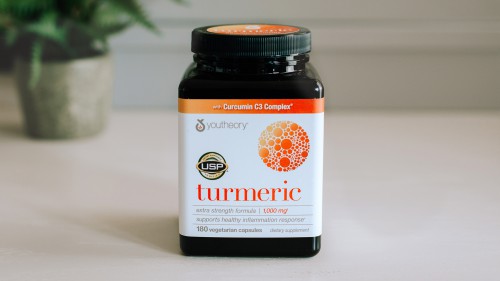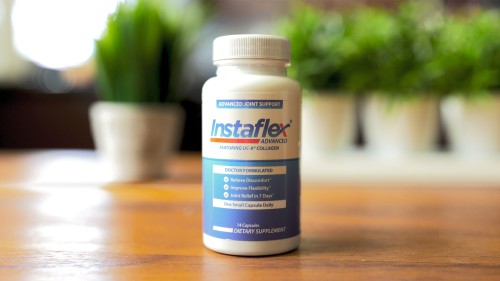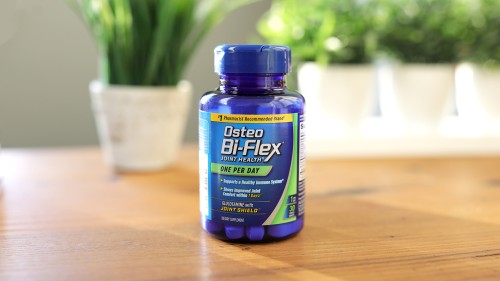WellnessVerge is reader-supported. We may earn a commission when you make a purchase through the links on this page. Learn more about our process here.
Qunol Turmeric Review: A Science-Backed Option for Joint Health
Last Updated on August 22, 2023
Medically Reviewed by Anthony Dugarte, MD
Turmeric offers many anti-inflammatory benefits but is poorly absorbed by our bodies when taken on its own. Qunol offers turmeric supplements that are optimized for absorption and loved by users.

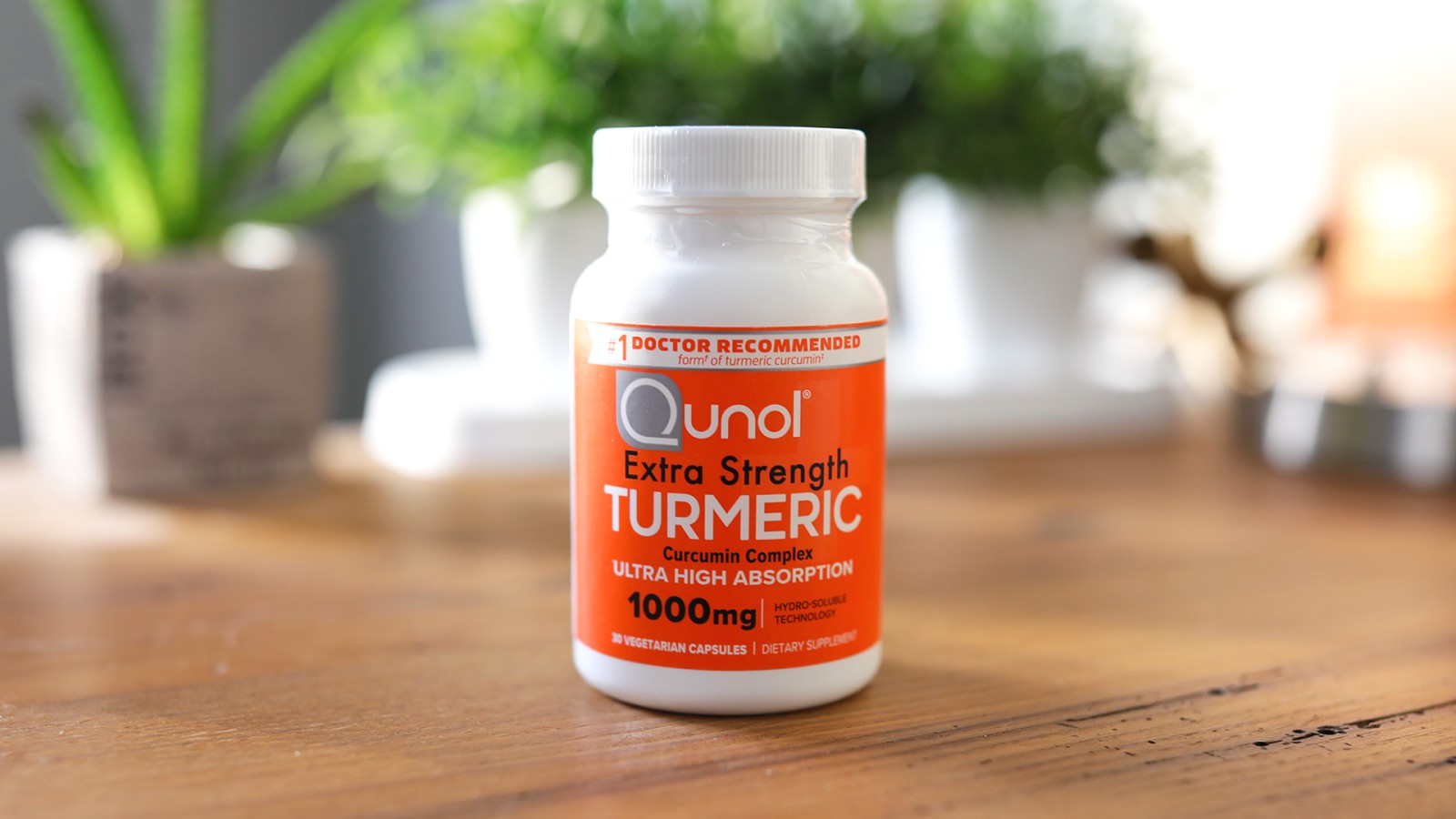
Key Highlights (TL;DR)
- Qunol offers various turmeric supplements designed to help support joint health and relieve inflammation.
- Strong research supports turmeric as having an effective anti-inflammatory and antioxidant effect and relieving knee pain.
- Qunol offers the proper dosages of turmeric, as used in various studies.
- Qunol’s turmeric products collectively have a 4.6-star rating on Amazon, based on over 60,000 customer reviews — with many stating that it has helped relieve their joint pain, including knee pain.
- Taking turmeric may not be safe for everyone, including those taking blood-thinning and diabetes medications.
What We Liked About Qunol Turmeric
- There is strong scientific support for using turmeric to promote joint health and alleviate pain and inflammation.
- The supplements are reasonably priced compared to other reputable turmeric/curcumin supplement brands.
- Qunol offers a variety of turmeric doses matching the ranges used in clinical studies.
- Qunol includes ingredients to help increase the absorption of turmeric, maximizing its effects.
Important Considerations
- Qunol does not provide a third-party testing verification seal.
- Although generally considered safe, taking too much turmeric for more extended periods may cause an upset stomach in some people.
- Everyone may respond differently to various daily turmeric dosages (Qunol does offer multiple doses of their turmeric for people to choose from).
- Turmeric may not be for everyone, especially if you’re taking medication.
Qunol Turmeric at a Glance
Qunol Turmeric offers several versions of its supplement designed to support joint health and reduce inflammation. Its product line comes in various dosages and forms (capsules, liquid, and gummies) of turmeric.
In addition, Qunol offers some of its products with added ginger. Research shows ginger also offers inflammation and pain relief and works synergistically with curcumin. However, studies on effective doses of ginger are between 250mg and 2g daily, while Qunol’s supplements contain less. (1)
The Qunol brand is owned and operated by Queten Research Institute, LLC, founded in 2006.
Qunol recently partnered up with Dr. Tiffany Di Pietro, a quadruple board-certified physician in cardiology and internal medicine who serves as the brand’s health advisor.
Important Note: The words turmeric and curcumin are often confused and used interchangeably. To clarify, turmeric is the spice made from grinding the rhizome (often called root) of the plant, while curcumin is the active anti-inflammatory component within turmeric, generally making up 5–6% of the rhizome’s content. (2)
Curcumin, on its own, poorly absorbs into our bloodstream, preventing us from receiving its full benefits. To increase the absorption of turmeric, Qunol adds either black pepper root extract or gamma-cyclodextrin to its products.
Specifically, gamma-cyclodextrin works by increasing the curcuminoids’ solubility and protecting them until they can be effectively used in the body. (3) The piperine from black pepper root extracts helps increase turmeric’s bioavailability by up to 2000%, which may enhance its absorption. (4)
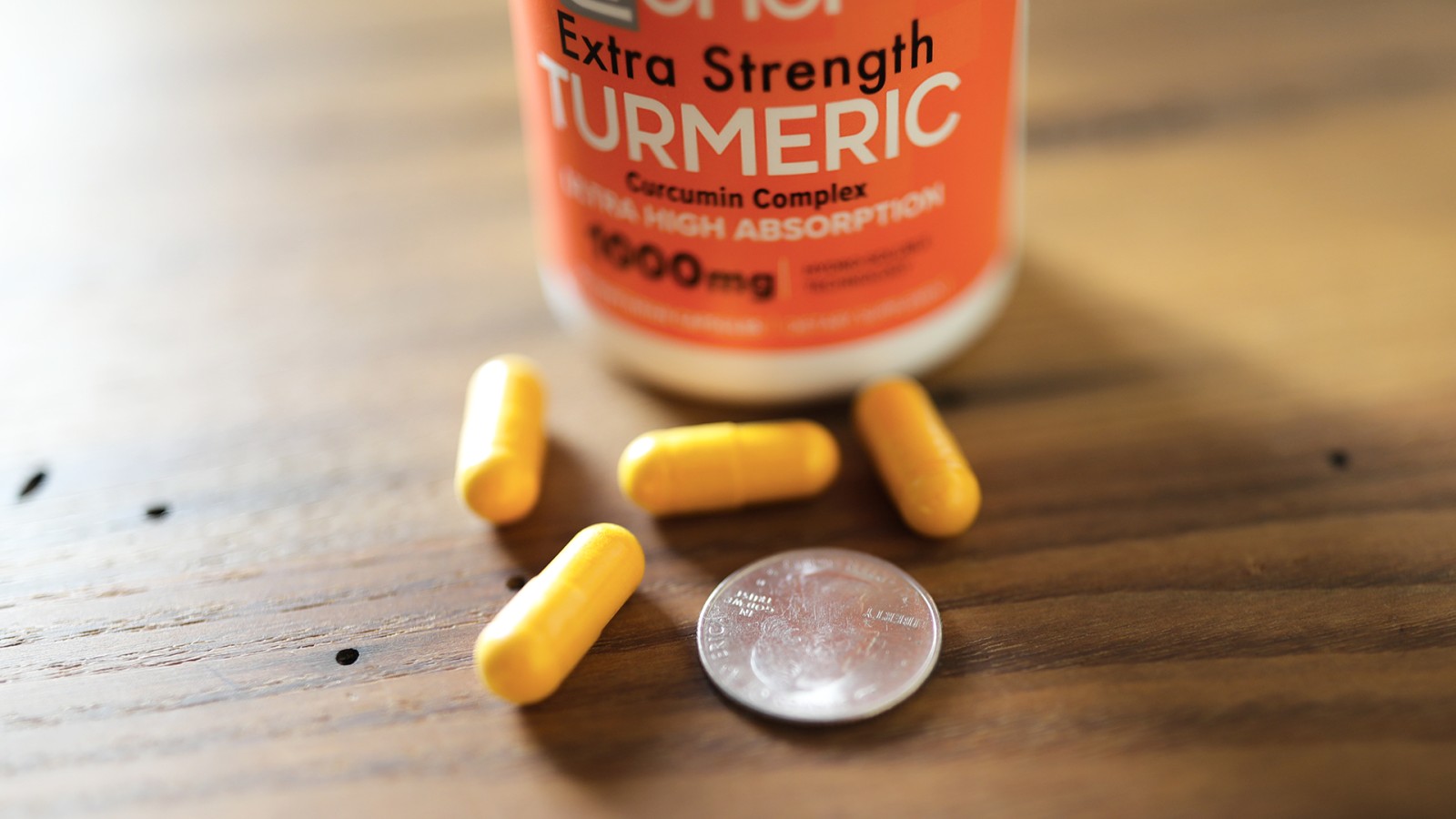
The Research Behind Qunol Turmeric
The active ingredient in Qunol is curcumin within turmeric. Humans have used turmeric for thousands of years as a dye, spice, and medicine.
Curcumin has been the subject of many randomized control trials in recent decades. Research supports the use of turmeric for reducing inflammation, including in those with arthritis, and supporting joint health — therefore making Quonol’s claims valid. (4, 5)
How Turmeric May Support Your Joint Health
Below are specific studies showing turmeric to alleviate joint pain:
- One 2014 study showed that when taking 1,500 mg of curcumin daily for four weeks, people experienced similar relief from knee pain due to osteoarthritis as people taking 1,200 mg of ibuprofen. (6)
- One 2020 study concluded that taking turmeric provided relief for osteoarthritis-related knee pain. However, it is not known what turmeric dosage the participants were taking. (7)
- Other studies show that taking 1,000 mg of turmeric daily may be an option for people with arthritis. Still, researchers conclude that more studies should be done. (8)
While there are no established doses of curcumin supplements, studies have shown benefits based on daily amounts ranging from 500–2,000 mg. (9)
Qunol has different versions of its turmeric supplements in daily doses ranging from 500 to 2,400 mg, which will likely put you in a good clinically-studied range.
Safety Considerations
Turmeric supplements, including Qunol, are generally considered safe. Specifically, research has shown that curcumin is unlikely to give adverse side effects when taken up to 12,000 mg daily (Qunol’s supplements contain significantly less). (10)
However, some mild side effects were reported, including diarrhea, headache, rash, and yellow stool. (11)
Turmeric supplements may interact with certain medications, including blood thinners, antidepressants, antibiotics, and diabetes medications (due to their ability to affect blood sugar levels).
Turmeric should be avoided by those who are pregnant or currently breastfeeding.
Although the safety of curcumin is fairly well documented, it’s best to discuss your symptoms with a primary care physician before initiating any over-the-counter supplement to ensure it’s safe for you.
Cost and Buying Options
Quonol’s turmeric product lines are available on the brand’s website at the following standard prices:
- Extra Strength Turmeric: $30 for 120-count (1,000 mg) and $42 for 180-count (1,500 mg)
- Turmeric Curcumin with Black Pepper (2,250 mg): $24 for 90-count
- Liquid Turmeric (1000 mg): $28 for 40 servings/20.3 oz
- Turmeric Curcumin with Black Pepper & Ginger (2,400 mg): $26 for 105-count
- Turmeric + Ginger Gummies (550 mg): $23 for 30 servings, $36 for 60 servings, and $52 for 90 servings
- Vegetarian Turmeric Curcumin Complex (500 mg): $30 for 60 servings
You receive 10% in savings if you subscribe to recurring shipments of any Qunol product.
Qunol provides a 30-day money-back guarantee (minus shipping costs) and free shipping on all orders over $25.
Additionally, Qunol Turmeric is sold at most major retailers, including Amazon, Walmart, Costco, Target, Walgreens, and more. Amazon has the best prices compared to other retailers, including Qunol’s website.
Comparison to Alternatives
The turmeric supplement market is oversaturated with products, making it difficult for consumers to determine what makes Qunol unique.
We compared two of Qunol's best-sellers to several top brands to help identify its strengths and weaknesses:
|
Qunol Turmeric Extra Strength |
Qunol Turmeric with Black Pepper |
Puritan’s Pride Turmeric Curcumin with Bioperine |
YoutheoryTurmeric Extra Strength |
Nature Made Turmeric Extra Strength |
mykind Organics Extra Strength Turmeric |
|
|---|---|---|---|---|---|---|
|
Turmeric Per Daily Serving |
1,000 mg turmeric complex (18%–22% curcuminoids) |
2,250 mg turmeric root extract (95% curcuminoids) |
3,000 mg turmeric root and root extact (95% curcuminoids) |
1,000 mg turmeric root extract (95% curcuminoids) |
1,000 mg turmeric root extract (95% curcuminoids) |
553 mg organic turmeric blend (95% curcuminoids) |
|
Form & Daily Dosage |
2 large capsules with food |
3 large capsules with food |
1 large capsule three times daily with food (3 total) |
2 large capsules |
2 large capsules with food |
1 large tablet |
|
Absorption / Bioavailability Enhancer |
Water dispersion technology which delivers ultra-high absorption |
15 mg black pepper fruit extract |
15 mg black pepper fruit extract |
10 mg black pepper fruit extract |
10 mg black pepper fruit extract |
7 mg organic black pepper fruit extract |
|
Price |
$29.99 / 60 servings |
$23.99 / 30 servings |
$9.45 / 20 servings |
$32.99 / 30 servings |
$21.99 / 30 servings |
$26.39 / 60 servings |
|
Price Per Daily Serving |
$0.50 |
$0.80 |
$0.47 |
$1.10 |
$0.73 |
$0.44 |
|
Adjusted Price for a Serving of 1,000 mg of Turmeric |
$0.50 |
$0.36 |
$0.16 |
$1.10 |
$0.73 |
$0.80 |
|
Third-Party Testing |
No info listed, Approved by ConsumerLab.com |
No info listed |
Approved by ConsumerLab.com |
USP Verified |
USP Verified |
USDA Organic, Non-GMO Project, Certified Vegan, Certified Gluten Free by NSF, Approved by ConsumerLab.com |
|
Allergen & Special Diet Consideration |
Vegan, non-GMO, soy-free, and gluten-free |
Vegan, non-GMO, soy-free, and gluten-free |
Soy-free and gluten-free |
Vegetarian, dairy-free, soy-free, and gluten-free |
Vegetarian, gluten-free, and preservatives-free |
Vegan, non-GMO, soy-free, gluten-free, Kosher |
|
Purchase |
Shop on Amazon | Shop on Amazon | Shop on Amazon | Shop on YouTheory | Shop on Nature Made | Shop on Amazon |
How to Choose the Right Turmeric Supplement
- Best for absorption and if needing to take the supplement without food: As we explained above, curcumin on its own is poorly absorbed into our bloodstream. Qunol Turmeric Extra Strength includes unique water dispersion technology to help deliver better absorption of the supplement — enabling it to use a smaller amount of curcuminoids (compared to the other products, which use black pepper extract to increase absorption). In addition, taking a turmeric supplement with a meal that contains fats or oils also helps with absorption. However, if your lifestyle does not always make it possible, Qunol Turmeric Extra Strength is a great choice due to its absorption technology.
- Best if you want to avoid black pepper extract: Black pepper extract is added to turmeric supplements to increase their bioavailability which enhances absorption. However, black pepper extract may interact with some medications. If you need to avoid this compound, Qunol Turmeric Extra Strength is again an excellent choice due to its unique absorption technology that does not use black pepper.
- Best for highest dose of turmeric: If you are looking for turmeric supplements with the highest dose of curcuminoids, Qunol Turmeric with Black Pepper and Puritan’s Pride Turmeric Curcumin with Bioperine are great picks. Both products require you to take three capsules per day and have the same amount of black pepper extract. However, Puritan’s Pride has a higher dose of turmeric while being less expensive, making it a slightly better pick.
- Best for third-party testing: Third-party testing ensures that the supplement contains what is stated on the label and is free of contaminants and unsafe amounts of heavy metals. Youtheory and Nature Made both have a USP seal, indicating a high-quality standard and making them great picks if this is your priority. In addition, Qunol Turmeric Extra Strength and Puritan’s Pride Turmeric Curcumin with Bioperine don’t display a seal, but they have been both tested and approved by ConsumerLab.com. Lastly, Qunol Turmeric with Black Pepper does not list any third-party testing information.
- Best-priced turmeric supplement: Puritan’s Pride Turmeric Curcumin with Bioperine offers not only the highest dose of turmeric, black pepper extract, and approval from ConsumerLab.com, but also the best price. Still, even though the Qunol Turmeric Extra Strength is more expensive than other products, the absorption technology justifies the higher price.
- Best if you want organic ingredients: mykind Organics Extra Strength Turmeric is your best choice. It is certified USDA Organic, Non-GMO Project Verified, and certified Gluten-Free by NSF. It is also approved by ConsumerLab.com. Unfortunately, Qunol Turmeric Extra Strength and Turmeric with Black Pepper are not organic.
At WellnessVerge, we only use reputable sources, including peer-reviewed medical journals and well-respected academic institutions.
- Synergistic Anti-Inflammatory Activity of Ginger and Turmeric Extracts in Inhibiting Lipopolysaccharide and Interferon-γ-Induced Proinflammatory Mediators - PMC:
https://www.ncbi.nlm.nih.gov/pmc/articles/PMC9229778/ - Turmeric, the Golden Spice From Traditional Medicine to Modern Medicine:
https://www.ncbi.nlm.nih.gov/books/NBK92752 - Effect of Cyclodextrin Complexation of Curcumin on its Solubility and Antiangiogenic and Anti-inflammatory Activity in Rat Colitis Model:
https://www.ncbi.nlm.nih.gov/pmc/articles/PMC2802154/ - Curcumin: A Review of Its’ Effects on Human Health:
https://www.ncbi.nlm.nih.gov/pmc/articles/PMC5664031/ - Effects of curcumin on serum cytokine concentrations in subjects with metabolic syndrome: A post-hoc analysis of a randomized controlled trial:
https://pubmed.ncbi.nlm.nih.gov/27470399/ - Efficacy and safety of Curcuma domestica extracts compared with ibuprofen in patients with knee osteoarthritis: a multicenter study - PMC:
https://www.ncbi.nlm.nih.gov/pmc/articles/PMC3964021/ - Therapeutic effects of turmeric or curcumin extract on pain and function for individuals with knee osteoarthritis: a systematic review - PubMed:
https://pubmed.ncbi.nlm.nih.gov/33500785/ - Efficacy of Turmeric Extracts and Curcumin for Alleviating the Symptoms of Joint Arthritis: A Systematic Review and Meta-Analysis of Randomized Clinical Trials - PubMed:
https://pubmed.ncbi.nlm.nih.gov/27533649/ - The efficacy and safety of Curcuma longa extract and curcumin supplements on osteoarthritis: a systematic review and meta-analysis - PMC:
https://www.ncbi.nlm.nih.gov/pmc/articles/PMC8202067/ - Dose escalation of a curcuminoid formulation - PubMed:
https://pubmed.ncbi.nlm.nih.gov/16545122/ - Dose escalation of a curcuminoid formulation:
https://bmccomplementmedtherapies.biomedcentral.com/articles/10.1186/1472-6882-6-10

